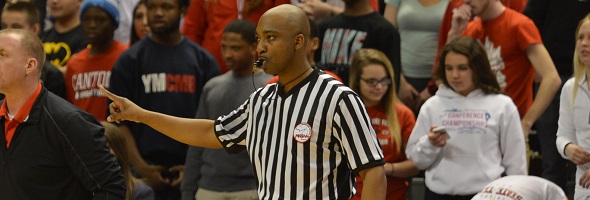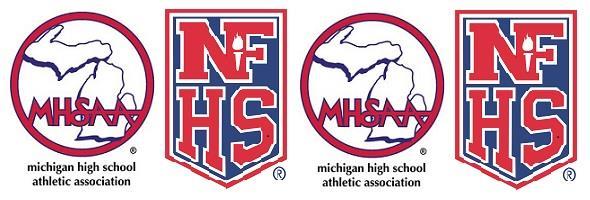
Be the Referee: Too Much TV
February 26, 2015
This week, MHSAA assistant director Mark Uyl explains how inaccuracies in TV play-by-play can lead fans to quote rules incorrectly.
Be The Referee is a series of short messages designed to help educate people on the rules of different sports, to help them better understand the art of officiating, and to recruit officials.
Below is this week's segment - Too Much TV - Listen
The over-saturation of sporting events on television has turned too many people into thinking they know it all about coaching and especially officiating.
This only gets worse when the television commentators themselves don’t know the rules. On a recent Sunday afternoon college basketball broadcast, the team trying to bring the ball upcourt had the ball knocked out of bounds twice by the defense, and the color commentator said the offensive team was down to 6 seconds to get the ball across the center line.
The fact is, whenever the ball is knocked out under those circumstances, the 10-second count resets; and whenever there’s a mistake on television like that, you can bet someone will take that as gospel and berate an official when it happens the next time they’re at a game.
Past editions
Feb. 16 - Video Clip Library - Listen
Feb. 9 - Cheer Safety - Listen
Feb. 2 - Basketball PA Announcers - Listen
Jan. 26 - Wrestling Health Concerns - Listen
Jan. 19 - Basketball Physical Contact - Listen
Jan. 12 - Video Review Part 2 - Listen
Dec. 29 - Video Review Part 1 - Listen
Dec. 17 - Registration Part 2 - Listen
Dec. 10 - Registration Part 1 - Listen
Dec. 3 - Legacy Program - Listen
Nov. 26 - Sideline Management - Listen
Nov. 19 - 7-Person Mechanics - Listen
Nov. 12 - Blocking Below the Waist - Listen
Nov. 5 - Tournament Selection - Listen
Oct. 29 - Uncatchable Pass - Listen
Oct. 22 - Preparation for Officials - Listen
Oct. 15 - Automatic First Downs - Listen
Oct. 8 - Officials & Injuries - Listen
Oct. 1 - Overtime - Listen
Sept. 25 - Field Goals - Listen
Sept. 18 - Tackle Box - Listen
Sept. 11 - Pass Interference - Listen
Aug. 25 - Targeting - Listen

Become an Official: HS Sports Need You
January 24, 2018
By Bob Gardner, Executive Director of the National Federation of State High School Associations
and Mark Uyl, Assistant Director of the Michigan High School Athletic Association
They don’t make the headlines, their names are not in the box scores and they don’t make the all-star teams. But perhaps the most important individuals in high school sports are the contest officials.
These individuals are so important that, in fact, there would be no organized competitive sports at the high school level without the men and women who officiate these contests every day across the country. Subtract the dedicated men and women who officiate high school sports, and competitive sports would no longer be organized; they would be chaotic.
In some areas of our country, high school officials are retiring faster than new ones are being added. And junior varsity, freshmen and middle school games are being postponed – or even cancelled – because there are not enough men and women to officiate them.
Anyone looking for a unique way to contribute to the local community should consider becoming a registered high school official. For individuals who played sports in high school, officiating is a great way to stay close to the sport after their playing days have ended. Officiating helps people stay in shape, expands their social and professional networks and offers part-time work that is flexible, yet pays. In fact, officiating is a form of community service, but with compensation.
Another benefit of officiating is that individuals become role models so that teenagers in the community can learn the life lessons that high school sports teach. Students learn to respect their opponents and the rules of the game and the importance of practicing good sportsmanship thanks, in part, to those men and women who officiate. And the objectivity and integrity that high school officials display is an example that every young person needs to observe firsthand. In short, communities around the country will be stronger because of the life lessons that high school officials help teach the next generation.
Officiating is a great way to stay connected to sports and to give back to the local high school and community. We need dedicated men and women to become involved so that high school sports can continue to prosper for years to come.
Individuals interested in learning more about becoming a high school official, and even beginning the application process, can do so at www.HighSchoolOfficials.com.

